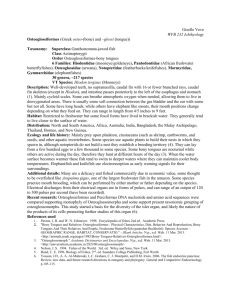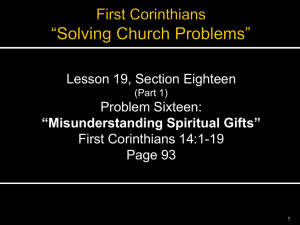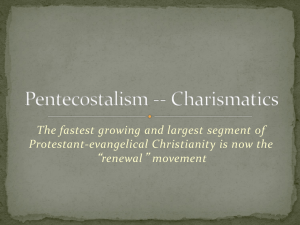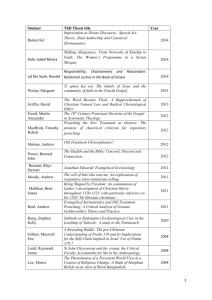- Grace Quest Ministries
advertisement
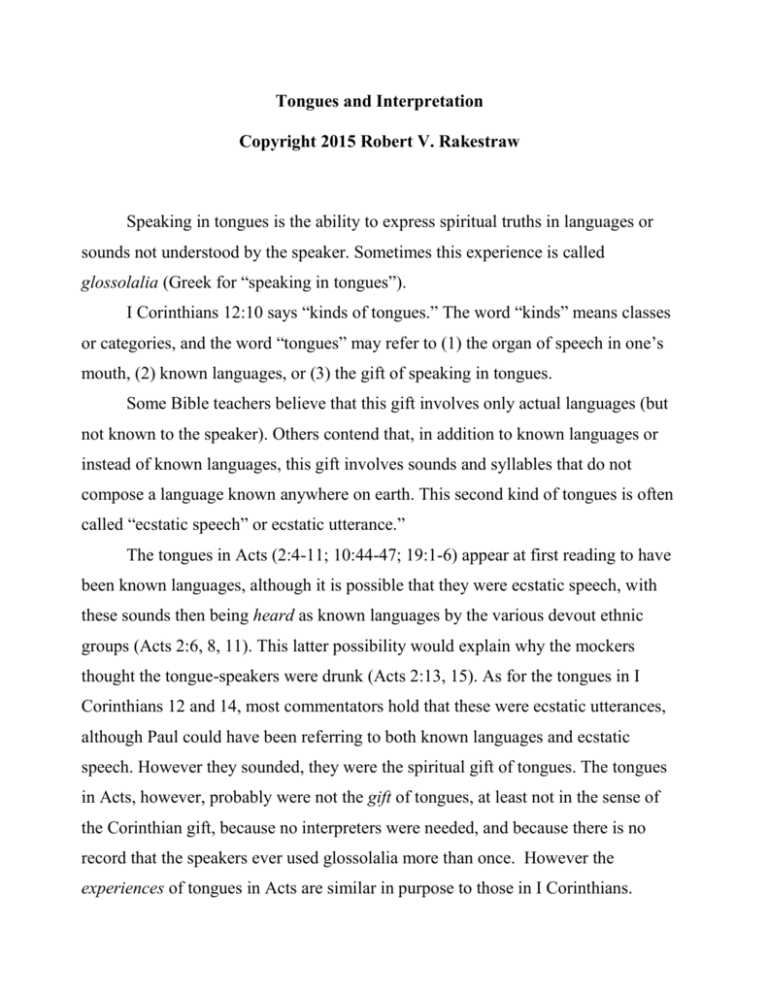
Tongues and Interpretation Copyright 2015 Robert V. Rakestraw Speaking in tongues is the ability to express spiritual truths in languages or sounds not understood by the speaker. Sometimes this experience is called glossolalia (Greek for “speaking in tongues”). I Corinthians 12:10 says “kinds of tongues.” The word “kinds” means classes or categories, and the word “tongues” may refer to (1) the organ of speech in one’s mouth, (2) known languages, or (3) the gift of speaking in tongues. Some Bible teachers believe that this gift involves only actual languages (but not known to the speaker). Others contend that, in addition to known languages or instead of known languages, this gift involves sounds and syllables that do not compose a language known anywhere on earth. This second kind of tongues is often called “ecstatic speech” or ecstatic utterance.” The tongues in Acts (2:4-11; 10:44-47; 19:1-6) appear at first reading to have been known languages, although it is possible that they were ecstatic speech, with these sounds then being heard as known languages by the various devout ethnic groups (Acts 2:6, 8, 11). This latter possibility would explain why the mockers thought the tongue-speakers were drunk (Acts 2:13, 15). As for the tongues in I Corinthians 12 and 14, most commentators hold that these were ecstatic utterances, although Paul could have been referring to both known languages and ecstatic speech. However they sounded, they were the spiritual gift of tongues. The tongues in Acts, however, probably were not the gift of tongues, at least not in the sense of the Corinthian gift, because no interpreters were needed, and because there is no record that the speakers ever used glossolalia more than once. However the experiences of tongues in Acts are similar in purpose to those in I Corinthians. Because of the plural “kinds,” because Paul speaks of “tongues of men and of angels” (I Cor. 13:1), and because of the widespread and persistent testimonies of modern-day Christians who claim to have heard their own languages from persons “speaking in tongues,” it seems best to admit that both kinds of glossolalia— languages and ecstatic speech—may be possible today. However, linguistic analyses have demonstrated that modern “tongues” seldom, if ever, fit any known language pattern. There are two dimensions to the gift of tongues. They may be intended for public use in the worship assembly or for private use by the individual Christian. When we read 1 Corinthians 14 we see the apostle Paul referring to both uses. Concerning the public use of tongues, Paul writes that this practice is of little benefit to the church unless the tongues are interpreted (vss. 2-19). Paul’s major concern (and it should be ours as well) is for the edification (strengthening) of the body of Christ, the Church. Paul gives three guidelines for the public use of tongues: (1) no more than two or three should speak in any one meeting, (2) they should speak one at a time, and (3) there should be an interpreter—either the speaker or another Christian (vss. 5, 13, 26-28). The whole point of 1 Corinthians 14 is that prophecy is superior to tongues unless there is interpretation (v. 5). When tongues are used improperly, without interpretation, they lead to confusion (vss. 20-25). Concerning the private use of tongues, Paul in 1 Corinthians 14 points out a number of benefits to the one speaking in tongues. The person speaks to God (vss. 2,28), speaks mysteries in his or her spirit (v. 3), and edifies (strengthens) himself or herself (v. 4). Concerning his own practice of speaking in tongues in private, Paul says that his spirit prays (vss. 14-15). He also sings with his spirit, which he distinguishes from singing with his mind (v. 15). Evidently Paul sang praises to God with sounds he did not even understand. Perhaps such singing in tongues occurred for him when he was so filled with joy and praise that he simply burst out in new musical sounds and melodies. Or it may have been a more quiet, meditative singing or humming. Paul explains further that the person speaking in tongues in private may be genuinely praising or “blessing” God in the Spirit and giving thanks “well enough” (vss. 16-17). He even says that he would like everyone to speak in tongues (v. 5), and thanks God that he speaks in tongues more than all of them (v. 18). Here Paul is obviously speaking of his private practice, because he follows verse 18 with the words, “But in the church” (v. 19a). How can Paul write so favorably of tongues as a private experience? He clearly does not see it as a mark of immaturity, unless people try to speak in tongues in church without interpretation or in other ways that are out of order. Furthermore, he cannot be writing about private tongues as actual foreign languages, because he doesn’t know what he is saying (v. 14). Even if these were real foreign languages that he had not learned, the experience for him would be the same—making sounds of praise and thanksgiving without knowing what he was saying. All we can do is let the scriptures speak for themselves and acknowledge that tongues in private can be a rich experience of inner strengthening. No one should try to push this experience on others, nor should anyone speak disparagingly of this blessing. We need to recognize that Satan attempts to counterfeit each of the gifts, and tongues is no exception. The Bible teaches the reality of demonic spirits possessing a person and actually speaking through the person’s mouth (Mark 5:1-21; Acts 16:16-18). But those who remain in fellowship with Jesus need not fear this happening to them (1 John 5:18). We should also admit that in some instances, tongues seem to be psychological. Sometimes people are at such spiritual or emotional crises in their lives that they need some psychological release, and they “speak in tongues.” Other people with the same crisis may cry uncontrollably, while others simply become numb and lose touch with reality for a time. It is not right to ridicule those who have had such a crisis experience of “tongues,” but it may be inaccurate to call it the gift of tongues. It is an experience of tongues that may strengthen a person inwardly. With some this speaking in tongues continues for years, while with others it occurs only once, or a few times. A person who speaks in tongues may ask: “How can I know if this is the gift or merely a psychological experience?” Paul does not address this question, and perhaps the best we can say is that only God knows for sure. We do know that godly speaking in tongues is not something that seizes a person irresistibly, but is under the control of the speaker, as with prophecy (1 Cor. 14:3233, 40). And we know also that the Holy Spirit will never lead us astray. if we are walking in the light, our fellowship with God is pure and blessed (1 John 1:5-7). Should speaking in tongues be practiced in our churches today? Only if the regulations of I Corinthians 14 are followed carefully. May we seek to exalt prophecy in our assemblies, but not forbid tongues if they are practiced properly and in order (I Cor. 14:39-40). (Other scriptures to study: Is. 28:11-12; Mark 16:17; Rom. 8:26-27; I Cor. 12:30; 13:1, 8; I Cor. 14; Jas. 3:5.) Interpretation of tongues is the ability to translate the spiritual truths expressed by a person speaking in tongues. The Greek noun in I Corinthians 12:10 and 14:26 is hermeenia, meaning translation or interpretation. A related word, diermeenuo, is used in I Corinthians 12:30; 14:5, 13, and 27, and means to translate, explain, or interpret. There is some disagreement about whether this gift involves translation only, or whether it includes some explanation also. Because of the way these Greek words and their related words are used elsewhere in the NT, it seems best to consider the gift of “interpretation” as translation only, and that may be a better name for the gift. The general rule in the early Church was that someone other than the tonguesspeaker should translate (1 Cor. 14:27-28). But if there was no translator present, the tongues-speaker should pray for the ability to translate (1 Cor. 14:13, also v. 5). A good rule for church leaders to follow is to ask, before someone speaks in tongues, whether an interpreter is present and willing to interpret. If not, the person should be asked not to speak in tongues unless he or she is prepared to interpret. (Other scriptures to study: All of 1 Cor. 14.)

